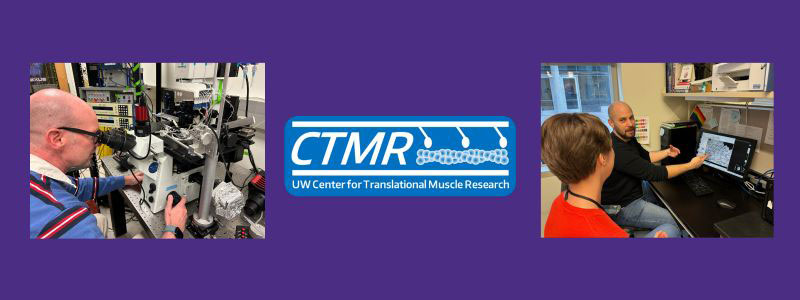
Left photo: Research Scientist, Tim McMillen, PhD, looks at muscle cell subunits (myofibrils) under the microscope to measure force as part of the Mechanics and Devices Core.. Right photo: “Postdocs, Sage Malingen, PhD (left) and Matthew Childers, PhD (right) discuss a molecular dynamics simulation as part of the qQuantitative Analysis Core.”
Skeletal muscle dysfunction is increasingly recognized as a major public health issue, leading to diminished quality of life and independence among affected individuals. This dysfunction stems from various pathological factors, ranging from genetic disorders such as muscular dystrophy to systemic conditions like diabetes, cancer, and aging. The UW Center for Translational Muscle Research (CTMR) aims to address this challenge by offering access to cutting-edge tools and training opportunities for emerging investigators.
Thanks to a $4.46 million grant from the National Institute of Arthritis and Musculoskeletal and Skin Diseases of the National Institutes of Health, the CTMR has received funding to continue its important research to 2029. Led by Michael Regnier, CTMR Director and Professor of UW Bioengineering, the Center accelerates research and the dissemination of breakthroughs in understanding and treating skeletal muscle dysfunction, seeking to enhance the bench-to-bedside impact of muscle research in the US and beyond.
“The first five years of the CTMR have been incredibly successful in supporting and facilitating muscle research in the Seattle area, bringing established and new scientists, engineers, and clinicians together to accelerate research efforts,” Regnier says. “The Center has also had impact across the US and Europe, bringing research groups together, catalyzing cooperative efforts to understand the causes of muscle diseases and to develop treatment strategies.”
The first five years of the CTMR have been incredibly successful in supporting and facilitating muscle research in the Seattle area, bringing established and new scientists, engineers, and clinicians together to accelerate research efforts – Michael Regnier
CTMR faculty, comprised of experts from UW, Seattle Children’s, and Fred Hutch Cancer Research Center, focus on muscle disease, aging, exercise and neuromuscular plasticity. Through four cores, the CTMR offers resources and expertise unique to UW, with the goal of accelerating innovative research and moving new treatments closer to clinical use with targeted small molecules, and gene and cell therapies. The cores include an administrative/enrichment core and three research resource cores: 1) Mechanics and Devices – multiscale analysis of contractile properties, 2) Metabolism and Energetics – multiscale analysis of energy production and utilization, and 3) Quantitative Analysis – structure-based computational models and data analytics tools. These cores provide cutting-edge tools for measuring key muscle properties, enabling a comprehensive understanding of muscle function and dysfunction, as well as responses to novel therapeutic approaches.
For example, CTMR researchers can analyze how a mutation in a muscle protein of a patient, or a certain drug affects muscle contraction. Using cell or animal models with this mutation, they can 1) determine the impacts on muscle contraction and relaxation properties (muscle biomechanics) and 2) test the impacts on energy production and usage (metabolism), which have direct impacts on muscle function. Coupling these wet-lab experimental approaches with 3) computational modeling allows the researchers to understand the mechanisms of muscle dysfunction resulting from the mutation, generate testable hypotheses and design possible approaches for treatment to rescue muscle function.
To facilitate new research and bring new investigators into the study of muscle diseases, the Center provides pilot awards to associated faculty to fund collection of preliminary data that can lead to success in applications for much larger awards from funding agencies.
In a particularly successful story, CTMR investigator, clinician scientist, and Assistant Professor of UW Medicine (Cardiology), Farid Moussavi-Harami, received two separate pilot awards from the CTMR. This helped jump-start the establishment of his lab by resulting in successful funding of grants from the National Institute of Health and the American Heart Association. Moussavi-Harami’s lab worked closely with the Mechanics and Quantitative Analysis Cores of the CTMR in combining machine learning with biologically informed dimension reduction techniques to analyze muscle function and dysfunction. The project culminated in a recent publication entitled “Machine Learning Meets Monte Carlo Methods for Models Muscle’s Molecular Machinery to Classify Mutations.” For this publication, Moussavi-Harami was awarded the Paul F. Cranefield Award from the Council of the Society of General Physiologists, which recognizes an independent young investigator who has published an outstanding article in the Journal of General Physiology over the past year.
It has been an honor to work, collaborate and learn from Drs. Tom Daniel, Jennifer Davis, and Regnier. – Farid Moussavi-Harami
“Funding and resources from CTMR have been critical for my laboratory exploring new areas in muscle research and obtaining external funding,” says Moussavi-Harami. “It has been an honor to work, collaborate and learn from Drs. Tom Daniel, Jennifer Davis, and Regnier.”
Over the past four years, the CTMR has trained new investigators and supported established ones and is committed and excited to remain a vital resource for the muscle research community with continued support.
Research reported in this article was supported by the National Institute Of Arthritis And Musculoskeletal And Skin Diseases of the National Institutes of Health under Award Number P30AR074990.

